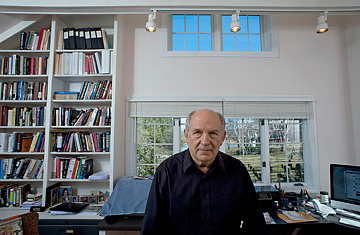
The hermit of Burkittsville. Murray gets perhaps one call a week at his rural Maryland home
(3 of 6)
But that fight was nothing compared with what would come with the publication of The Bell Curve. Knowing that their material was potentially explosive, Murray and Herrnstein had constructed their chapter on race with "the care of a haiku," having their wives read it to ensure it would not be taken out of context. Murray believes that The Bell Curve's critics willfully misread the book. Still, many academics denounced its conclusions, and Donna Shalala, then Secretary of Health and Human Services, called it "almost surreal." It didn't help when the New York Times revealed that Murray, while in high school, had once burned a cross outside his town's police station. The experience left Murray "extremely depressed" for a year or two, he says.
The exile of the post--Bell Curve years does not suit Murray. Sixty-nine years old, bearded and avuncular, he has an easy sociability and a natural curiosity; he is ripe for awe. Midway through an account of the frustrations of the time, Murray hesitates, with self-awareness dawning. "Please convey," he says, "that I don't feel as if I'm a damaged human being."
Because Murray kept some powerful friends--conservative columnist Charles Krauthammer, think-tank pioneer Christopher DeMuth--his life was divided between the two poles of the class spectrum, one in Washington and the other in Burkittsville, and he began to think these cultures were increasingly isolated from each other. In Murray's memories of his own Iowa boyhood, Maytag executives and blue collar workers had socialized together. During the past few years, he has come to believe that those worlds no longer physically intersect. "The spatial element is very important," he says. Murray was very taken by the work of journalist Bill Bishop, who documented the increasing isolation of the elite in a few small geographic pockets (Murray calls them the "SuperZIPs") where they interact only with those who went to elite schools, as they did, and hold influential jobs like theirs. Searching for a way to describe that isolation to his elite readers, he came up with a quiz: Have you ever purchased Avon products? Have you ever had a close friend who was an evangelical Christian? Each answer carries a score. "What score did you get?" he asks me gleefully.
